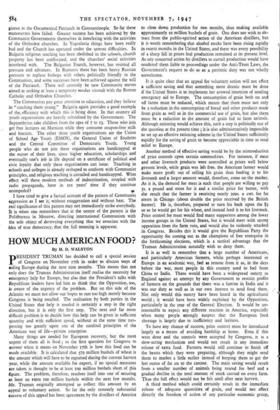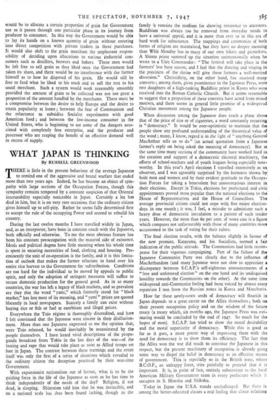HOW MUCH AMERICAN FOOD?
By H. D. WALSTON PRESIDENT TRUMAN has decided to call a special session of Congress on November 17th in order to discuss ways of aiding Europe during the next nine months. This means that not only does the Truman Administration itself realise the necessity for emergency help for Europe, but also that the President's talks with Republican leaders have led him to think that the Opposition, too, is aware of the urgency of the problem. But on this side of the Atlantic we must not allow our hopes to run too high merely because Congress is being recalled. The realisation by both parties in the United States that help is needed is certainly a step in the right direction, but it is only the first step. The next and far more difficult problem is to decide how this help can be given in sufficient quantity and with sufficient speed, without at the same time tres- passing too greatly upon one of the cardinal principles of the American way of life—private enterprise.
Many things are needed for European recovery, but the most urgent of them all is food ; so the first question for Congress to answer when it meets on November 17th is how this food can be made available. It is calculated that 57o million bushels of wheat is the amount which will have to be exported during the current harvest year, while the amount available for export, if no special measures are taken, is thought to be at least too million bushels short of this figure. The problem, therefore, resolves itself into one of securing at least an extra too million bushels within the next few months. Mr. Truman originally attempted to collect this amount by an appeal to voluntary action. So far the only remotely substantial success of this appeal has been agreement by the distillers of America
to close down production for two months, thus making available approximately to million bushels of grain. One does not wish to de- tract from the public-spirited action of the American distillers, but it is worth remembering that alcohol stocks have been rising rapidly in recent months in the United States, and there was every possibility of a sharp fall in prices had production remained at its present level. As any concerted action by distillers to curtail production would have rendered them liable to proceedings under the Anti-Trust Laws, the Government's request to do so as a patriotic duty was not wholly unwelcome.
It is quite clear that an appeal for voluntary action will not effect a sufficient saving and that something more drastic must be done if the United States is to implement her avowed intention of sending emergency aid to Europe. The consumption of grain both on and off farms must be reduced, which means that there must not only be a reduction in the consumption of bread and other products made from grain as well as in the commercial use of grain, but also there must be a reduction in the amount of grain fed to farm animals. Although rationing would achieve this, such a step is politically out of the question at the present time ; it is also administratively impossible to set up an effective rationing scheme in the United States sufficiently rapidly for the saving of grain to become appreciable in time to send relief to Europe.
Another method of effective saving would be by the reintroduction of price controls upon certain commodities. For instance, if meat and other livestock products were controlled at prices well below present levels, while grain was left free, the American farmer would make more profit out of selling his grain than feeding it to his livestock and a larger amount would, therefore, come on the market. As it is, the demand for meat is such that people are willing to pay 5s. a pound and more for it and a similar price for butter, with the result that the farmer is receiving nearly zoos. a cwt. for fat steers in Chicago (about double the price received by the British farmer). He is, therefore, prepared to turn his back upon the $3 or so he would get for his wheat, and instead feed it to his livestock. Price control for meat would find many supporters among the lower income groups in the United States, but it would meet with strong opposition from the farm vote, and would also be violently attacked in Congress. Besides this it would give the Republican Party the opportunity for corning out as the champions of free enterprise in the forthcoming elections, which is a tactical advantage that the Truman Administration naturally wish to deny them.
It is as well to remember that a large number of Americans, and particularly American farmers, while perhaps interested in Europe in an academic way, feel as remote from it as, in the days before the war, most people in this country used to feel from China or India. There would have been a widespread outcry in England against an attempt by any Government to restrict profits of farmers on the grounds that there was a famine in India and it was our duty as well as in our own interest to send food there. Not only would this outcry have been heard in the agricultural world ; it would have been widely exploited by the Opposition, particularly in the year of the General Election. It would be un- reasonable to expect any different reaction in America, especially when many people strongly suspect that the European food shortage is largely due to inefficiency and laziness.
To have any chance of success, price control must be introduced largely as a means of avoiding hardship at home. Even if this were done and the controls were accepted by Congress, it rs a slow-acting mechanism and would not result in any immediate release of extra food. Farmers would still continue to finish off the beasts which they were preparing, although they might send them to market a little earlier instead of keeping them to get the last ounce of fat on to the carcase. The main saving would result from a smaller number of animals being reared for beef and a gradual decline in the total amount of stock carried on every farm. Thus the full effect would not be felt until after next harvest.
A third method which could certainly result in the immediate release of adequate quantities; of grain, and would not affect directly the freedom of action of any particular economic group,
would be to allocate a certain proportion of grain for Government use as it passes through one partkular phase in its journey from producer to consumer. In this way the Government would be able _to lay its hands on a known quantity of grain without entering into direct competition with private traders in these purchases. It would also shift to the grain merchant the unpleasant respon- sibility of deciding upon allocations to various industrial con- sumers such as distillers, brewers and bakers. These men would be left free to sell grain as they liked once the Government had taken its share, and there would be no interference with the farmer himself as to how he disposed of his grain. He would still be free to feed what he liked to his stock and to sell the rest to his usual merchant. Such a system would work reasonably smoothly provided the amount of grain to be collected was not too great a proportion of the amount handled by the merchants. There must be a compromise between the desire to help Europe and the desire to retain popularity at home ; between the fear of Commnnism and the reluctance to subsidise Socialist experiments with good American food ; and between the low-income consumer in the United States, who is beginning to see some of the dangers asso- ciated with completely free enterprise, and the producer and processor who are reaping the benefit of an effective demand well in excess of supply.



































 Previous page
Previous page